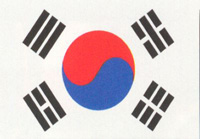South Korea discuss with China North Korean missile test
A high-ranking government official said Seoul had pressed for the bilateral talks, but that Washington was reluctant because it felt that the North's invitation shouldn't have been made public, South Korea's Yonhap news agency reported. The official wasn't identified.

A North Korean diplomat said last week that the country wanted to speak directly to the U.S. over its missile concerns, repeating its long-held desire for bilateral contact with the Americans. But Washington has refused, saying it would only see the North Koreans at six-nation nuclear arms talks in Beijing, which haven't taken place since November due to the North's boycott.
South Korea also believes it was meaningful that the North earlier this month invited chief U.S. nuclear envoy Christopher Hill to Pyongyang, the unidentified South Korean official said, while appearing to indicate that any such trip wasn't expected anytime soon, according to Yonhap.
Song Min-soon, a top presidential security adviser, said Monday that South Korea was closely cooperating with the U.S. in devising countermeasures against the North's launch, but noted there were differences between the allies.
On other diplomatic fronts, South Korean Foreign Minister Ban Ki-moon was traveling to China Monday evening for talks on the issue.
China, a key provider of aid to the impoverished North, is believed to be the only country with considerable leverage over Pyongyang.
Ban told lawmakers Monday that Seoul was also "in bilateral discussions with the U.S. and Japan for deliberation on various countermeasures," according Oh Kyung-sik, an aide to Ko Heung-kil, a lawmaker from the opposition Grand National Party, the AP reports.
The steps include issuing a joint statement by the three countries condemning the North's missile launch, if it occurs. Ban noted the top diplomats from Japan, South Korea and the U.S. issued a similar statement when the North fired a missile that flew over northern Japan in 1998, Oh said.
Subscribe to Pravda.Ru Telegram channel, Facebook, RSS!





